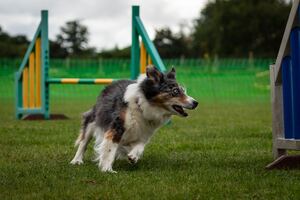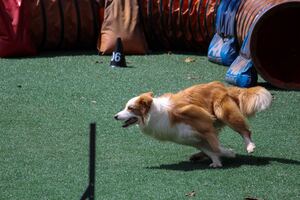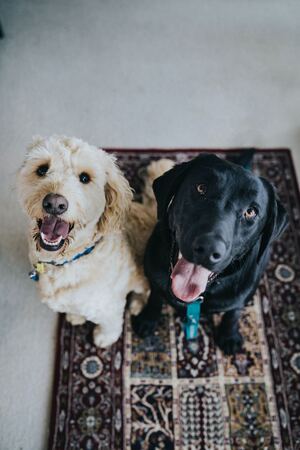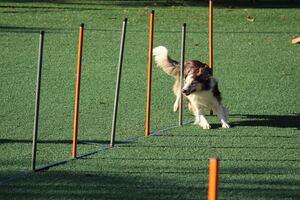
Your dog ignores commands because it may not understand them or it's distracted by something else.
More...

Dog Ignores Commands: Fix It Now!
Guiding your dog's behavior is essential for responsible pet ownership, but it can be frustrating when they don't listen despite your best efforts.
We invest time and effort to teach our furry friends basic commands like sit, stay, and come.
However, sometimes our dogs ignore us entirely. If you're experiencing frustration with your pup's disobedience issues, read on.
In this article, we'll look at some of the common causes behind disobedient behavior in dogs and offer advice on improving communication with your furry friend.
So if you're feeling frustrated by your dog's lack of responsiveness, read on for helpful tips!
33 Reasons Your Dog Ignores Your Commands(1 - 18) | |
|---|---|
1 | Lack of Training The dog may need adequate training to understand and follow commands. |
2 | Distractions If the environment has too many distractions, the dog may focus more on other things than obeying commands. |
3 | Fear or Anxiety Fearful or anxious dogs may not respond to their owners' commands because they're too stressed out. |
4 | Health Issues In some cases, dogs with medical problems may struggle to obey their owners' commands due to pain or discomfort. |
5 | Conflicting Signals Owners who use inconsistent body language or vocal cues could confuse their pets and make it harder for them to understand what they should do. |
6 | A dog that feels dominant over its owner may choose not to listen to commands if it doesn't feel like doing so. |
7 | Age Young puppies need more time for training than older dogs. |
8 | Frustration Bad experiences during previous training can lead to an unwillingness to obey. |
9 | Regression Behavioral regression occurs when pets stray from trained behaviors due to lack of practice, routine, exercise, etc. |
10 | New environments can sometimes distract animals and affect their responses, mainly when unfamiliar. |
11 | Tone Wrong tones/commands from owners may cause disobedience in dogs if the tone could be appealing for teaching. |
12 | Personality Training certain dogs can be challenging due to their distinct personalities. |
13 | Timing If there is a delayed response, dogs may become disobedient due to the disparity between expectation and reality. |
14 | Performance Pressure Dogs may struggle to obey their owners due to performance anxiety. |
15 | Malnourishment More food to keep up with energy levels required by training. |
16 | Human Aggression In some cases, a dog may be aggressive toward its owner, making it challenging for the owner to train and control it. |
17 | Dogs may not take orders seriously when they are excessively playful. |
18 | Inconsistency Conflicting cues from handlers can confuse dogs, leading to disobedience. |
Why Your Dog Ignores Your Commands (19 - 33) | |
|---|---|
19 | Separation Anxiety Recognizing and addressing separation anxiety in dogs improves obedience and communication between dog and owner. |
20 | Time and Patience Animal trainers and dog owners may only sometimes see immediate results, as obedience can take time to develop. |
21 | Lack of Socialization Puppies not socialized or exposed to diverse environments may have developmental issues. |
22 | Command Word Dogs may ignore commands due to not recognizing a specific command word. |
23 | Enticing Smells Enticing smells can cause dogs to ignore commands. |
24 | Confidence Issues Unconfident dogs may show untrained behavior like aggression, excessive barking, jumping up on people, and begging for food. |
25 | Boredom/Lack of Stimulation |
26 | Too Much Ambient Noise |
27 | Different Temperament/Aptitude From the Breed Standard |
28 | Bad Past Experiences Lead To Distrust Towards Owners/Strangers |
29 | Poor communication skills between owner and pet |
30 | Lack of Positive Reinforcement |
31 | Negative Association With a Command |
32 | Inconsistency in Expectations/Standards |
33 | The Excitement Level Is Too High |
Practical Dog Training For Better Behavior
Owners may need to appropriately train their dogs, which could be why they do not follow commands.
It's easier for trainers to communicate their expectations during training sessions when dogs have routines and structure.
Overall, educating your pup with consistent commands leads to better behavior and understanding.

Train Easily Distracted Dogs Efficiently
Dogs have short attention spans and can quickly become distracted by outside stimuli such as other people or animals nearby, smells or noises that catch their interest, or even something as simple as a wind blowing past them.
To improve your dog's obedience when outside, consider using high-value treats or toys as positive reinforcement during training sessions.
Furthermore, it is crucial to set realistic expectations when training your dog.
Remember that dogs are individuals and may require different approaches or more patience than others.

Anxiety in Dogs: How Owners Can Help
Some dogs may avoid following commands if they're anxious or fearful about the situation, especially if they've had negative experiences with similar circumstances.
A dog may not respond to its owner's commands if it feels scared or anxious.
For instance, this can occur when the dog perceives a threat; their instinct is to protect themselves from danger.
In such situations, owners must remain calm and patient with their furry friends.
Moreover, dogs rely on body language and tone of voice to understand what we are trying to communicate.
Hence, they might become more anxious and unresponsive if they sense negative emotions in an owner's voice or behavior.
As responsible pet parents, we must ensure that our actions do not cause further stress for our beloved companions during their vulnerable moments.
Dog Health Impacts Behavior and Obedience
If a dog isn't feeling well due to illness or injury, following through with commands may be too physically demanding.
Specific health problems, such as internal health issues, can make it difficult for dogs to respond to commands.
For example, if your dog is experiencing pain or discomfort due to a medical condition, he may not be able to focus on following your instructions.
In some cases, dogs may also become lethargic and less responsive due to underlying health problems.
Therefore, pet owners must watch for any signs of ill health and get their furry friends checked by a veterinarian regularly.
By doing so, you can ensure that your dog stays healthy and happy while always maintaining good behavior.

Caring for Older Dogs With Hearing Loss
Older dogs tend to lose their hearing abilities over time, making it difficult for them to hear some instructions given by the owner, leading to ignoring most cues provided.
Moreover, older dogs or those exposed to loud noises for prolonged periods may also develop hearing problems.
Under these circumstances, owners can use hand signals or other visual cues to communicate with their cozy comrades.
Additionally, regular visits to the veterinarian can help detect any underlying hearing issues and provide timely treatment options.

Understanding and Managing Dominant Dogs
Household dynamics can have an impact on how pets behave.
When one member of the household asserts more dominance over pets, it can lead to disobedience toward other members.
Moreover, this results in ignoring all calls from those individuals altogether, causing a breakdown in communication and obedience.
Some dogs have dominant personalities, meaning they might choose not to listen if the command challenges their authority.
Additionally, dominant dogs may exhibit aggressive behavior towards other pets and even humans if they feel threatened or challenged.
Therefore, it is vital to understand your dog's personality and tendencies before training them to avoid unwanted confrontations.

Distinct Canine Personalities and Behaviors
One of the most important things for a pet owner to recognize is that each dog has distinct personality and behavior patterns.
Sometimes, we may expect too much from our furry friends because of preconceived notions based on breed stereotypes.
However, it's essential to remember that each dog within a breed can have unique personality traits.
Nevertheless, if your dog ignores commands, don't assume this is due to their breed's behavioral pattern.
Evaluating your dog's behavior, training requirements, and special training needs is vital rather than relying on stereotypes about breed behavior.
Focused Training for Optimal Results
Sometimes pet owners forget that their woolly allies may be occupied with other things when they give them instructions.
As a result, their pets may unintentionally ignore their commands.
Therefore, pet owners must understand that their pets need undivided attention when receiving instructions.
Interrupted training sessions can lead to confusion and frustration for the pet and owner.
Also, dedicating time solely to training strengthens the bond between the pet and owner and improves obedience in the long run.
In other words, avoiding distractions during instruction promotes effective communication with pets, resulting in a well-trained furry companion who understands commands promptly.
Collaborating for Clear Pet Care Instructions
Occasionally owners of the same pet provide different instructions leading to confusion hence non-compliance and negative results.
Moreover, it is also essential to consider each pet's needs and behavior. Some may require specific routines or accommodations that differ from others.
Furthermore, misunderstandings and potential harm to the animal's well-being can occur without clear communication between owners and consistent instructions for pet care.
Effective collaboration between pet owners ensures a happy and healthy life for their fluffy co-pilots.
Consistency Is Key for a Happy Dog
Inconsistency is a common reason dogs ignore commands; inconsistency leads to mixed signals, which confuse the animal, especially if there needs to be continuity between training sessions.
Thus, dogs thrive on routine and consistency; if the rules keep changing, it can confuse and frustrate them.
As creatures of habit, dogs require a predictable daily routine. They enjoy knowing what to expect and feel comfortable when their environment remains consistent.
Furthermore, introducing too many changes in your dog's life can lead to stress and anxiety.
It is best to keep things simple and maintain an established routine that includes regular exercise, feeding times, and playtime.
Ultimately, it is vital for pet owners to always consider the impact of any new changes on their hairy pals.
As a result, planning will help ensure a happy and healthy life for you and your beloved animal companion.

Engaging Dogs to Prevent Boredom
A bored dog often ignores an owner's commands as it prefers to engage in more entertaining activities.
Additionally, a bored dog can become destructive and engage in unwanted behaviors such as chewing on furniture, digging holes in the yard, or barking excessively.
Thus, providing mental stimulation and physical exercise is crucial to keep your furry friend entertained and happy.
As a result, spending quality time with your dog by going for walks or playing games together is essential for maintaining a healthy relationship between you and your pet.
In other words, keeping your dog engaged will prevent boredom and promote positive behavior.
Build Trust With Dogs
It takes time for dogs to build trust with their owners; obedience becomes more likely with trust.
For this reason, owners must be patient and consistent in building a bond with their furry friends.
Moreover, spending quality time with them is crucial, providing love and care.
Also, positive reinforcement techniques like treats and toys can help build trust faster.
Ultimately, a strong bond between dog and owner leads to obedience and creates a happier and healthier relationship.
Do Your Treats Provide Enough Incentives?
Like humans, dogs have different likes and dislikes regarding food and treats.
Therefore, it's essential to experiment with different types of treats and find which ones work best as an incentive for your pet.
Doing so increases their motivation and creates a stronger bond between you two by building trust through consistent positive reinforcement training techniques.
Advanced Dog Training Without Treats
If dogs are only motivated to obey commands because of food, they are likely to stop obeying once the food reward is no longer available.
However, food rewards are still effective in dog training.
In fact, they can be a powerful tool when used appropriately and alongside other forms of positive reinforcement.
Furthermore, it is essential to remember that dogs also respond well to praise, affection, and play as rewards for good behavior.
By incorporating a variety of motivational factors into their training regimen, owners can encourage long-term obedience and foster strong bonds with their soft cohorts.

Reinforcing Positive Behaviors in Dogs
Dogs ignoring their owners' commands is a common problem, often resulting from a lack of reinforcement.
When we fail to reward our dogs for good behavior, they may ignore us altogether.
Therefore, this can be especially true when it comes to complex or challenging tasks that require more effort.
By taking the time to reinforce positive behaviors properly, we can help ensure that our cozy confidants stay engaged and responsive, even in the face of complex challenges.
Balancing Demands and High Standards
Dogs have a limited attention span and can quickly become overwhelmed by multiple commands or expectations.
Additionally, dogs may ignore their owners' commands due to fear, anxiety, or lack of proper training.
Furthermore, dog owners must establish a strong bond with their pets and positive communication through reward-based training.
Assessing Your Dog’s Training Needs
Inadequate or inconsistent training can often lead to owners needing help with their dogs following commands.
In addition, the dog's temperament and personality can also contribute to this behavior.
Some dogs may be more independent and require additional motivation or rewards to comply with obedience commands.
Hence, creating a personalized training plan tailored to your dog's needs can lead to successful results.
Dog Confusion: Unclear Owner Cues?
Dogs might ignore their owners' commands due to unclear cues.
Nevertheless, dogs are intelligent animals, but they rely on consistency and clarity from their owners.
If you use different words or gestures for the same command, your dog will become confused and might not respond appropriately.
Furthermore, if you give too many commands at once or in a noisy environment, your dog might miss important information and disregard them altogether.
To avoid this behavior, establish clear verbal cues with simple and precise language that your dog can understand clearly, even in distracting settings.

Is Frustration Building Up Within You?
If you feel frustrated when your dog ignores commands, don't worry because you can teach them to listen and obey with consistent training and patience.
There can be several reasons why dogs ignore their owners' commands.
For instance, some dogs could become immune to specific words if overused.
However, remaining persistent and patient while training your dog is crucial.
It would help if you used positive reinforcement techniques to encourage good behavior consistently.
Only then will your furry companion truly understand and follow commands effectively?
With time and effort, you can establish a strong bond with your furry friend and improve their responsiveness to your commands.

Solving Emotional Issues in Disobedient Dogs
If your dog is not following commands, it could be due to emotional problems interfering.
Some possible reasons for this behavior include anxiety, fear, stress, or lack of trust in their owner.
For this reason, identifying the underlying cause and working with a professional trainer or veterinarian to address the issue is imperative.
Brain Training for Neglected Dogs
Owners may feel frustrated or worried when their dogs ignore commands. Neglecting to exercise a dog's mind can contribute to disobedience and destructive behavior.
Like physical activity, mental stimulation is essential for a dog's well-being.
Moreover, brain training activities such as interactive toys, puzzles, obedience exercises, scent games, and agility courses challenge a dog's cognitive abilities while providing positive reinforcement for good behavior.
Incorporating brain training into your dog's routine enhances the bond between owner and pet and promotes better obedience.
Professional Help for Disobedient Dogs
Pet owners must seek professional help if their dog ignores commands consistently, which could indicate an underlying behavioral issue.
Understanding why your dog ignores your commands is crucial.
Therefore, this helps identify the root cause and find appropriate solutions, such as seeking help from certified trainers or conducting proper research on dog obedience training.
Avoiding repetitions and ensuring consistency throughout all sessions for effective results is noteworthy.
Additionally, it's important to note that various factors may contribute to your dog's disobedience.
These could include environmental distractions, lack of proper socialization and exposure to stimuli, underlying medical conditions or pain, inadequate mental stimulation, or physical exercise.
To effectively deal with these issues and regain control over your pet's behavior, you can use positive reinforcement techniques such as rewarding good behavior and redirecting negative actions without punishment or force.

In the Final Analysis
Consistency is key when training a dog; hence, you must be patient and persistent in implementing new routines until they become habits for you and your best friend.
Besides, doing so will build trust and a strong bond with your dog while ensuring their safety and well-being.
Owners must take time to train their pets while creating structure/routine at home through positive reinforcement.
A healthy relationship between an owner and pet means better communication, thus making training sessions more accessible and enjoyable for both parties.








